Birds can be ideal companions for seniors, bringing joy, color, and song into their lives without the high maintenance needs of other pets. They are particularly appealing to those with limited mobility, living in smaller or pet-restricted spaces, and those allergic to fur and dander. Their lively chatter and melodious singing provide therapeutic background noise, acting as a soothing and engaging presence in the lives of the elderly.
Birds are not just low-maintenance and economical, but their companionship is a valuable source of comfort and enrichment for seniors, offering a reprieve from loneliness and isolation. Whether you’re looking for a charming, talkative companion for yourself or a senior loved one, choosing the right bird species is crucial. In this guide, we present a list of seven best bird breeds for seniors, each bringing its unique charm and joy to their owners lives.
Canaries
Canaries are delightful, small birds known for their vibrant colors and calming, melodious songs that resonate around the world. With their compact size and minimal care requirements, they make excellent companions, particularly for seniors or those in recovery who prefer pets with less physical demands. Their lively demeanor and tranquil tunes offer solace and amusement, requiring minimal attention, making them ideal for individuals in long-term care facilities or nursing homes.
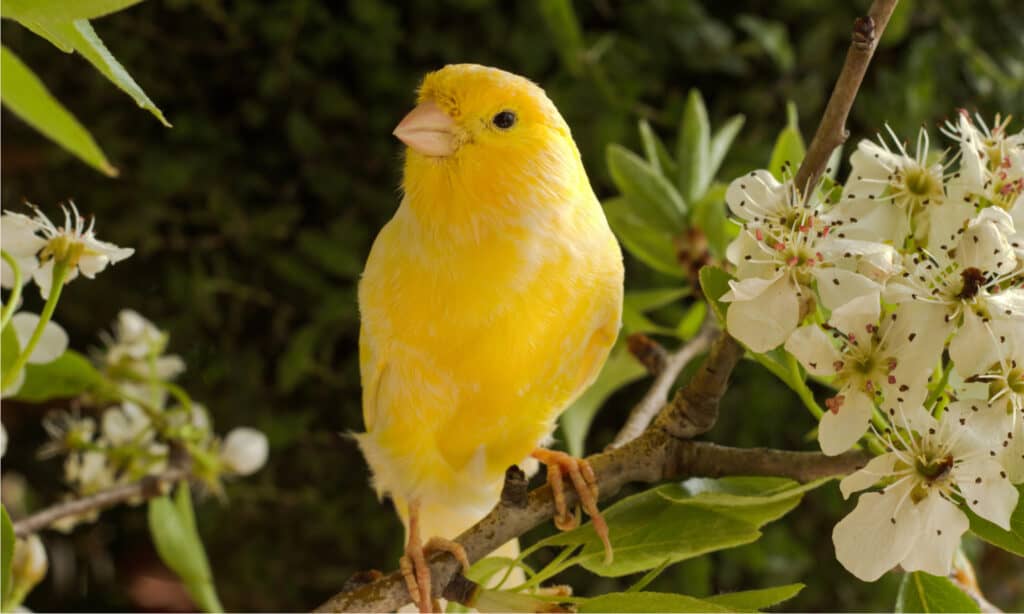
Canaries are delightful, small birds known for their vibrant colors and calming, melodious songs that resonate around the world.
©Yulia 0606/Shutterstock.com
Canaries are universally celebrated for their softer, soothing songs, and is considered the most calming among bird breeds recommended for seniors. It’s males who are more renowned for their singing and vocalization, compared to females. These friendly, sociable birds are active yet content to remain in their cages, without the need to fly around the house, and can be kept singly or in pairs. Their adaptability, cheerful disposition, and minimal interaction make canaries an exemplary choice for elderly individuals, especially those residing in care facilities, offering companionship that is both engaging and comforting. The longevity of canaries, living up to 10 years in captivity, ensures a lasting companionship, bringing joy and a sense of peace to their owners.
| Characteristic | Description |
|---|---|
| Size | 4 – 8 inches |
| Lifespan | 10 – 15 years |
| Initial Cost | $40 – $150 |
| Color Varieties | Yellow, White, Green, Blue, Cinnamon, Fawn |
| Cage Requirements | 30″L x 16″H |
| Weight | Approximately 1/2 ounce |
| Physical Interaction | Minimal; no handling required |
Zebra Finches
Zebra Finches are delightful, small birds known for their sociable nature and pleasant vocalizations. Their need for companionship requires owners to keep them in flocks, enhancing the joy of observing their interactions. These active birds can be a source of solace, especially for elderly individuals who can simply sit by and enjoy their sweet tunes and flitting movements. The relatively easy care and minimal need for physical interaction make them an excellent choice for seniors or those in nursing/caretaker settings. However, their requirement for a larger flight cage to accommodate their flocking behavior means potential owners should have adequate space.
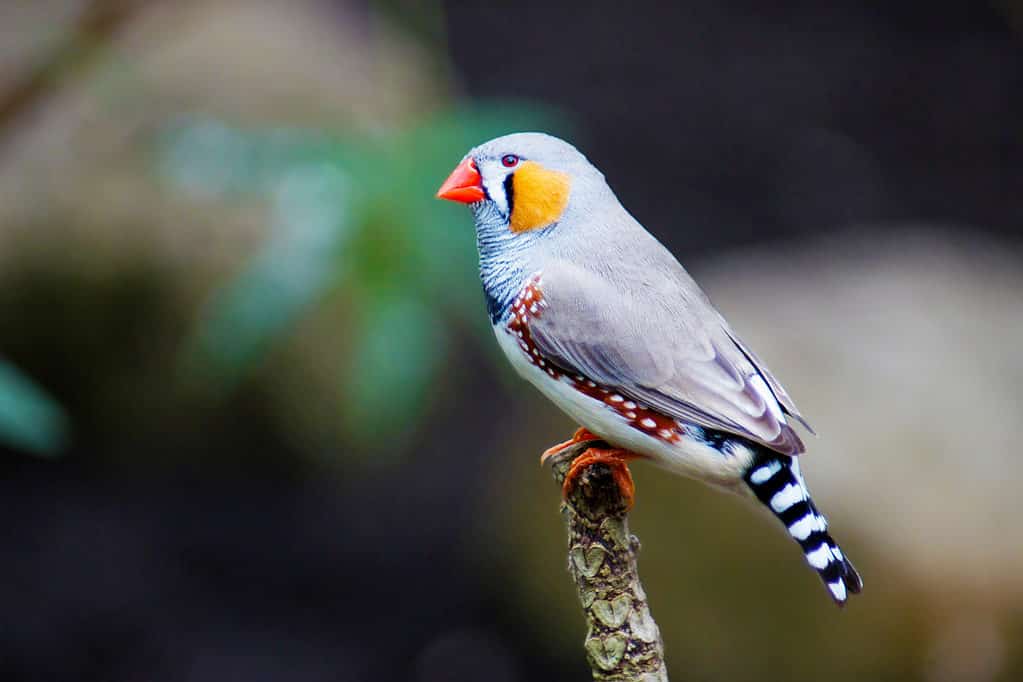
These active birds can be a source of solace, especially for elderly individuals who can simply sit by and enjoy their sweet tunes and flitting movements.
©Natalia van D/Shutterstock.com
| Characteristic | Description |
|---|---|
| Size | 3.9 – 4.3 inches |
| Lifespan | 2 – 5 years |
| Initial Cost | $10 – $40 |
| Color Varieties | Gray, Fawn, White, Beige, Cream, Charcoal |
| Cage Requirements | 24″L x 18″W x 18″H |
| Weight | Approximately 1/2 ounce |
| Physical Interaction | Minimal; prefer visual contact and company |
Budgies (Parakeets)
Budgies, also known as Parakeets, are small, colorful, and friendly parrots that have endeared themselves to many due to their engaging personalities and pleasant vocalizations. For seniors looking for vibrant and interactive companions, Budgies make an excellent choice, offering both companionship and daily amusement.
These petite parrots are especially suitable for seniors who enjoy direct interaction with their pets and can dedicate at least an hour each day to play and socialize with them. While they are vocal, their chirps and talks are generally pleasant and lack the abrasive screams typical of larger parrot species. For seniors with a fair amount of mobility and the desire for a more interactive pet experience, Budgies offer not just companionship but also the joy of teaching them to talk and the pleasure of their playful antics.
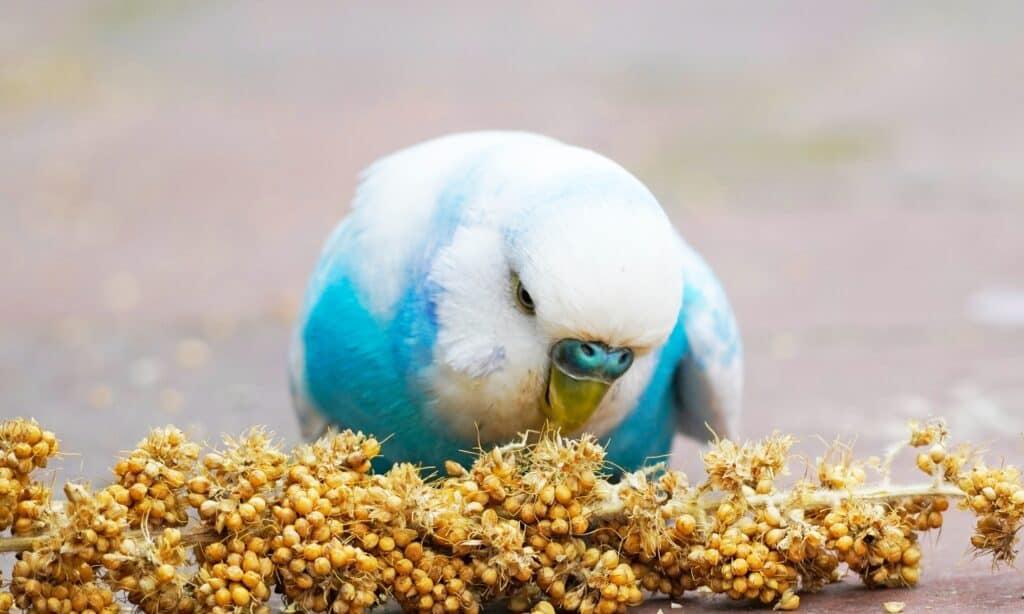
While they are vocal, their chirps and talks are generally pleasant and lack the abrasive screams typical of larger parrot species.
©iStock.com/EllyMiller
| Characteristic | Description |
|---|---|
| Size | 6 – 8 inches |
| Lifespan | 5 – 15 years |
| Initial Cost | $10 – $400 |
| Color | Multi-colored including blue, green, yellow, etc. |
| Cage Requirements | 20″ L x 18″ W x 18″ H |
| Weight | Approximately 1 ounce |
| Interaction Level | High; enjoys being petted, stroked, and handled |
Cockatiels
For elderly individuals, Cockatiels can offer not just companionship but also daily entertainment and interaction. The males, known for being more outgoing, often entertain their owners with their mimicking noises and playful antics, while the females are usually calmer. These intelligent birds require human company to thrive and should ideally be kept in pairs to prevent loneliness when human companions are not around.
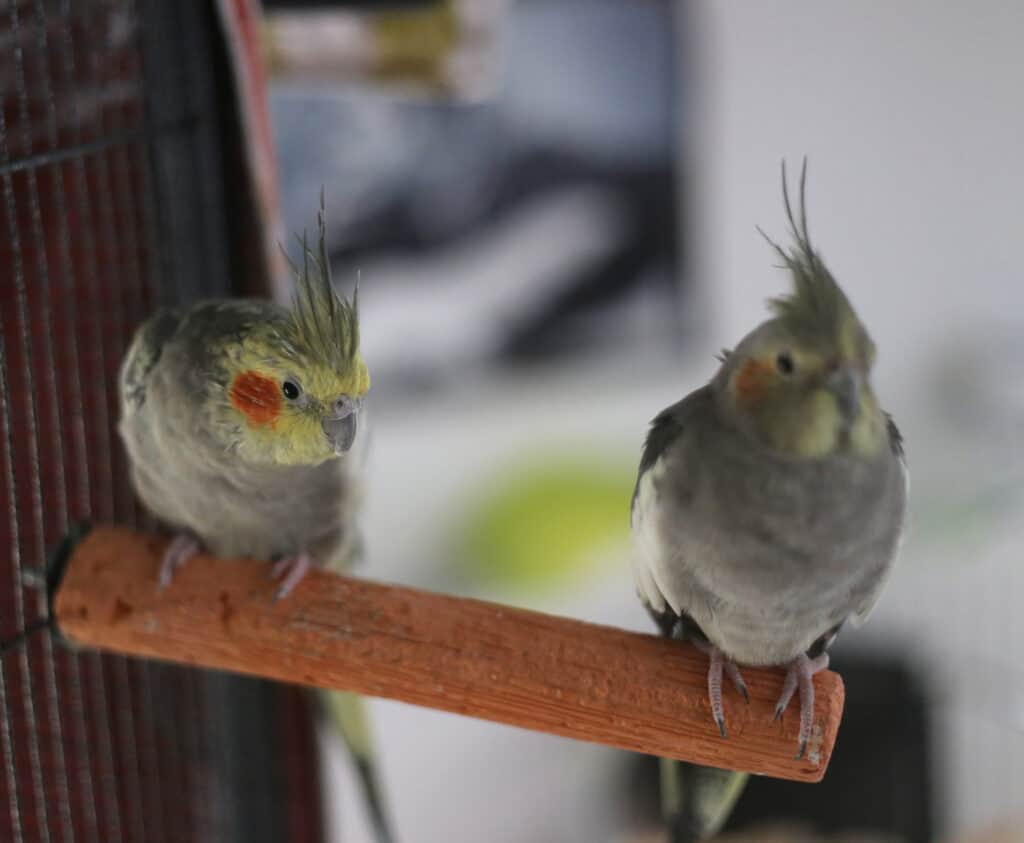
These intelligent birds require human company to thrive and should ideally be kept in pairs to prevent loneliness when human companions are not around.
©iStock.com/jojoo64
Seniors looking to adopt a Cockatiel should be willing and able to spend quality time with them and should appreciate the bird’s unique ability to mimic various sounds, which can add an element of joy and surprise to their daily lives. For seniors who enjoy a responsive and interactive pet, Cockatiels can be a delight to have around, adding vibrancy and music to their homes.
| Characteristic | Description |
|---|---|
| Size | 11 to 12 inches |
| Weight | 2.5 to 3.5 ounces |
| Physical Appearance | Light gray body, long dark gray tail, yellow and gray crest, yellow face; orange ear patch and white on the wings; dark gray bill |
| Cage Requirements | 24” L x 18” W x 24” H |
| Interaction Level | High; require company of humans to flourish; expressive and responsive |
| Lifespan | 15-20 years |
| Preferred Company | Best maintained in pairs |
Parrotlets
Parrotlets are the smallest of the pet parrots and make lively companions for seniors. They carry the personality traits of their larger relatives, the macaws, offering spunk and charm in a much smaller package. These birds are active but not overly noisy, making them ideal for apartments or homes with noise-sensitive neighbors. Parrotlets can be amusing companions, enjoying hiding in shirt pockets or scarves and even riding around on shoulders, bringing joy and engagement to their owners.
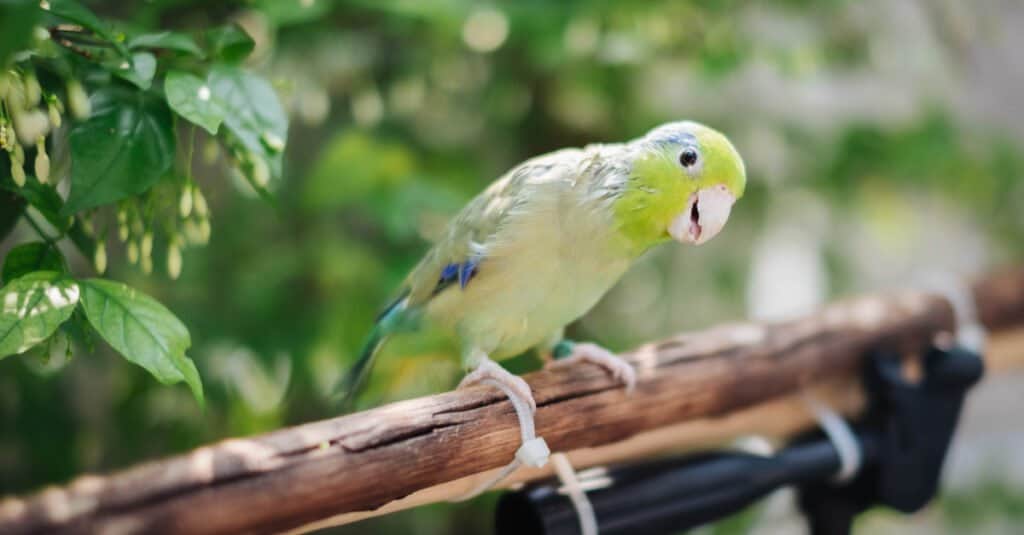
These birds are active but not overly noisy, making them ideal for apartments or homes with noise-sensitive neighbors.
©Redhatz69/Shutterstock.com
For seniors considering a Parrotlet as a companion, it’s crucial to note that with a lifespan of up to 30 years, these birds may outlive their elderly owners. Therefore, adopting an older bird who needs a home might be a thoughtful option. For those who are looking for a small, sassy, and engaging avian companion without the excessive noise, a Parrotlet could be the perfect choice, adding a splash of color and a dose of personality to their lives. Regular interaction and proper socialization are key to enjoying a relationship with these spirited little birds.
| Characteristic | Description |
|---|---|
| Size | 4 to 5 inches |
| Weight | 1 ounce |
| Physical Appearance | Available in various color mutations including green, lutino, blue, and albino; tiny tails, zygodactyl feet |
| Cage Requirements | 18” L x 18” W x 18” H |
| Interaction Level | High; requires regular handling and socialization |
| Lifespan | Up to 30 years |
| Bonding | Can bond well with humans when properly socialized and kept alone |
Doves
Doves, renowned for their serene and amiable nature, are an ideal pet for gentle and calm owners. They boast softer beaks, making them less likely to bite or cause any harm compared to the hard-beaked parrots, offering a peace of mind to their caregivers. These birds are distinguished by their sweet behaviors and would usually need another bird companion, making them best kept in pairs. Doves are interactive and enjoy engaging with their owners, but they also appreciate the companionship of other doves, reflecting the importance of social bonds in their lives. They thrive in calm and positive environments and react well to gentle socialization and bonding techniques.
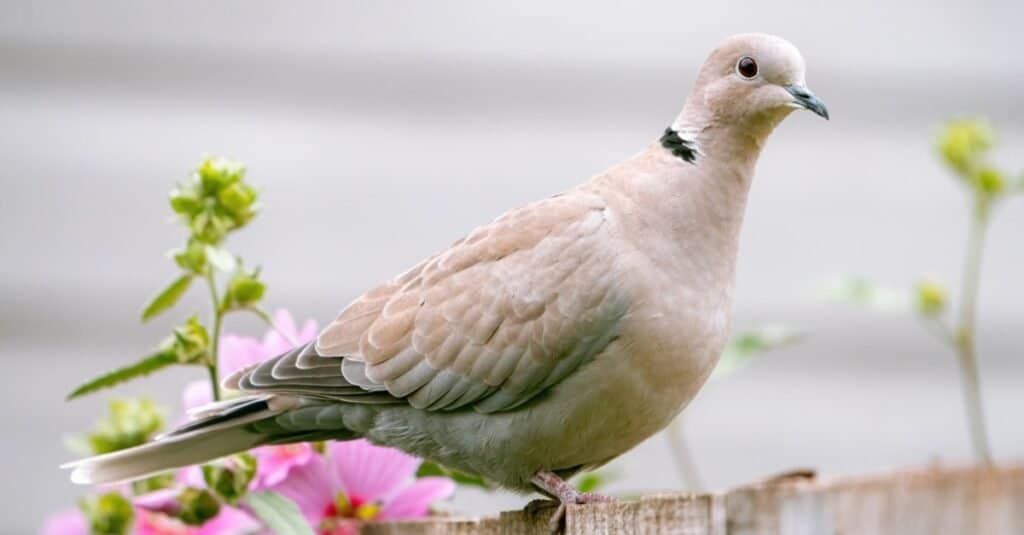
They thrive in calm and positive environments and react well to gentle socialization and bonding techniques.
©Oren Douek/Shutterstock.com
Providing mirrors and swings inside the Doves enclosure can enhance their activity levels, and allowing them free-flight time out of the cage for interaction with human caretakers fosters bonding and happiness. For elderly owners, especially those who prefer a more tranquil companion, doves can be a wonderful match, bringing a sense of peace and companionship to their lives.
| Characteristic | Description |
|---|---|
| Size | 11 to 13 inches |
| Weight | 5 to 8 ounces |
| Physical Appearance | Available in pure white, gray, white with gray, tangerine, pied, and orange; black eyes, black bill, and dark purple feet |
| Interaction Level | High; require bird companionship and human interaction |
| Cage Size | At least 24″ L x 24″ W x 24″ H for a pair of doves |
| Lifespan | Typically around 10-15 years |
| Preferred Company | Best maintained in pairs |
Lovebirds
Lovebirds, with their colorful plumage and amiable chatter, are ideal companions for those residing in apartments or condominiums. Their quiet and peaceful nature makes them suitable for living environments where louder pets might be disruptive. They possess a vibrant and charming demeanor, and despite their small size, they are intelligent and have personalities comparable to the larger macaws.
Even though they may have larger-than-life personalities, Lovebirds have a unique way of expressing themselves. Especially when kept in pairs or small groups, they tend to communicate in a subdued, quiet manner. This trait makes them a perfect match for those residing in quieter or shared living spaces, where maintaining a peaceful environment is crucial. Seniors who choose Lovebirds as companions can look forward to peaceful interactions, observing their vibrant colors, and experiencing their unique and captivating personalities, all while enjoying the peace they bring to their homes.
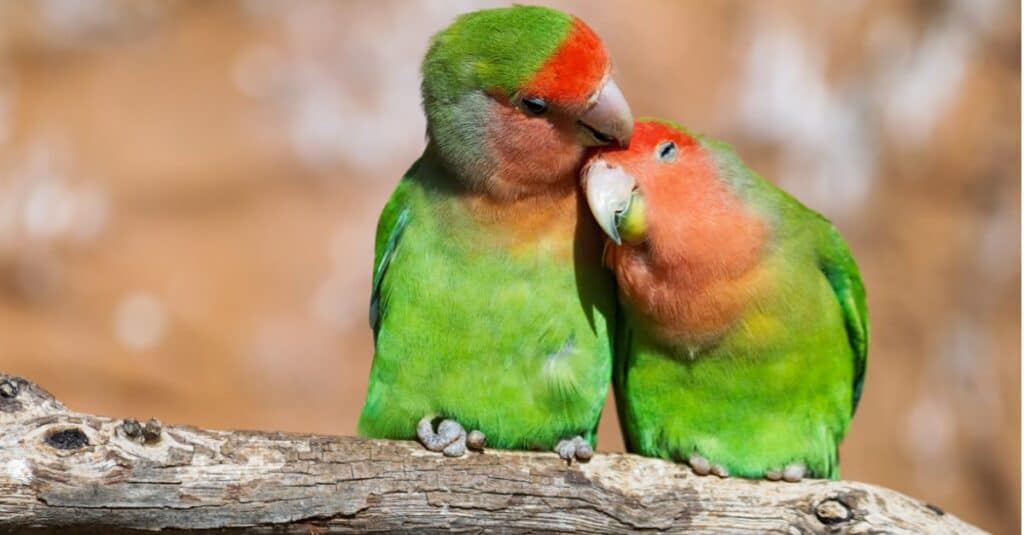
Especially when kept in pairs or small groups, they tend to communicate in a subdued, quiet manner.
©irakite/Shutterstock.com
| Characteristic | Description |
|---|---|
| Size | 5 to 6 inches |
| Weight | 2 ounces |
| Physical Appearance | Mostly green, with orange upper body and head, blue lower back and rump, red beak, and white eye-rings |
| Interaction Level | High; known to be assertive and can be nippy |
| Cage Size | At least 18″ L x 18″ W x 18″ H for one bird |
| Lifespan | Typically around 10-15 years |
| Noise Level | Low; suitable for apartments |
The photo featured at the top of this post is © Andrey Sayfutdinov/Shutterstock.com
Thank you for reading! Have some feedback for us? Contact the AZ Animals editorial team.







